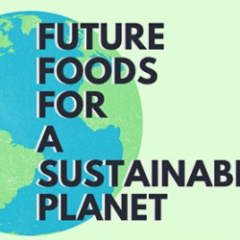Hello Everyone!
My name is Saskia and I commenced my PhD in the Centre of Nutrition and Food Science (CNAFS) in April this year.

The timing proved both lucky and unlucky at the same time, as a few of you can probably relate. My journey to Australia started at the time when the borders started to close down in every country, it felt like being in a James Bond movie.
When I finally arrived, I was obliged to self-isolate for 14 days, which made the beginning very hard. Especially in the sense of getting to know other PhD fellows – I truly felt socially isolated.
Although the COVID-19 pandemic has made it an exceptional situation for everyone, my supervisory team did a great job in reacting flexibly and although these are very stressful times, they gave me a lot of support.
I felt the need to get involved with other PhDs and therefore was looking for opportunities to do so. At the time, the QAAFI student association (QSA) was hosting weekly Zoom meetings to keep students connected, where topics related to academic and future career paths were discussed.
Developing a webinar series
Having a virtual space to interact with other students and researchers motivated me to join the QSA and thereby contribute to ideas for future Zoom discussions. This is how we conceived a three-part webinar series to talk to experts from academia and industry about securing food for a growing population with a focus on sustainability.

The first session consisted of an introductory seminar about sustainable food production by The Good Food Institute, a non-profit organization based in the United States. This webinar highlighted the importance of addressing the global protein demand through research and innovation in the space of alternative proteins.
We specifically talked about current advances in the development of plant-based and cell-based meat as a sustainable way to feed the growing population with a positive impact on the environment. Moreover, the discussion brought up other important considerations for human health, such as the challenges of making plant-based meat equally nutritious to its animal counterpart.
For our second session, we invited senior researchers from QAAFI to talk about the current challenges of our food system under climate change. The combined research expertise of our panellists in meat science, plant biotechnology, food safety and nutrition allowed for an engaging conversation that touched on the science behind food production and current approaches for sustainability.
We talked about the benefit of using crop improvement to reduce land and water use, as well as implementing effective pest and disease management technologies to improve fruit productivity. Additionally, we discussed the importance of diet diversification using alternative proteins and local Australian native plants as sustainable food sources.
The session allowed us to debate about the need for improving the communication of food and nutrition science to consumers, especially because our eating habits and resulting food choices will be the drivers of our future food system.
In the third and final session we introduced a panel of speakers to talk about driving sustainability and innovation in the global food industry.
We discussed that one potential way to reduce the carbon footprint of food products could be via introducing a tax reduction for products that emit less CO2 during their life cycle.
When it comes to comparing food products in regard to their carbon footprint, we need to be critical when looking at the data. The reason for that is that a food produced via a certain technology can be highly efficient, nutritious and have a low impact, whereas the same food produced via a slightly different technology can turn out with rather poor characteristics.
Therefore, it is crucial to close the gap between average and best performance, for example by developing new technologies that allow the global industry to produce food in an efficient and sustainable manner.
Furthermore, it is crucial to keep in mind that the nutrition of food products is just as important, along with transparency in claims, high standards around brand marketing and labelling. Because the way food products are marketed, has a major role to play when it comes to decision-making of consumers when buying their food. Overall, the seminar series ‘Future Foods for a Sustainable Planet’ was a great success. We brought together researchers from QAAFI and industry to discuss important topics related to current and future challenges of our food system.
The topics we discussed gave rise to future discussions and idea generation. Thanks to the combined efforts of QSA members, we were able to organise these sessions within a very short timeframe. We were able to highlight the importance of such events, as they are a great catalyst to bring together graduate students, researchers, and industry partners.
Watch the ‘Future Foods for a Sustainable Planet’ seminar series
Contact: Saskia Urlass E: s.urlass@uq.net.au, QAAFI Student Association E: qsa.qaafi@gmail.com
Check out the ‘Future Foods for a Sustainable Planet’ seminar series playlist and the QSA webpage.

